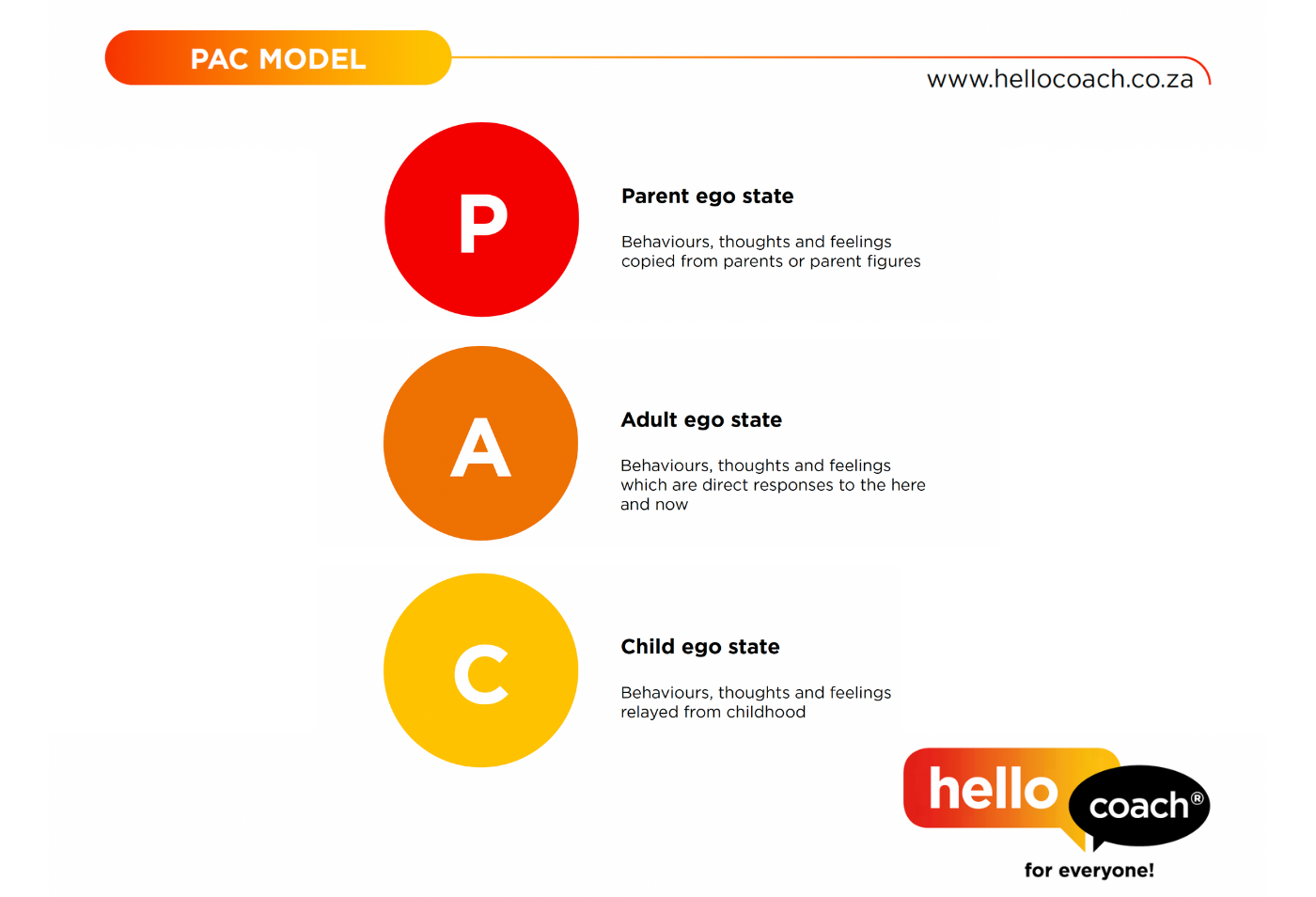Master the PAC Model for Better Communication and Personal Growth
The PAC Model, short for the Parent-Adult-Child Model, is a concept rooted in Transactional Analysis (TA), a psychological framework developed by Eric Berne.
This model simplifies human personality into three distinct “ego states”—Parent, Adult, and Child.
These states influence our behaviours, thoughts, and feelings and shape how we interact with others. Let’s explore the PAC Model, its impact, and how understanding and applying this strategy can lead to transformative personal and professional growth.
Understanding the PAC Model
The Parent Ego State (P)
This state embodies the behaviours, thoughts, and feelings we have absorbed from parental or authority figures during our upbringing. It acts as a repository of values, attitudes, and rules we learned in childhood. Characteristics: nurturing or critical tendencies, protective instincts, or judgmental perspectives. For example, offering advice or reprimanding oneself for perceived mistakes often stems from this ego state.
The Adult Ego State (A)
Operating as the rational and logical part of our psyche, the Adult ego state processes information based on the present moment. It analyses situations without emotional bias and seeks solutions rooted in facts and practicality. Characteristics: calm reasoning, problem-solving, and data-driven decision-making. When you weigh the pros and cons of a choice objectively, you’re functioning in this state.
The Child Ego State (C)
This state reflects the behaviours, thoughts, and feelings we experienced as children. It includes our innate creativity, curiosity, and emotional responses, as well as fears, insecurities, and habits developed early in life. Characteristics: playful spontaneity, sensitivity, or even rebelliousness. That burst of joy when you hear your favourite song or the frustration from unmet desires likely arises from the Child ego state.
The PAC Model in Action
Each ego state plays a significant role in shaping interpersonal interactions and self-awareness. Understanding these states allows individuals to identify the root of their reactions and adjust their behaviour accordingly. Here’s how the PAC Model can create a meaningful impact:
- Enhanced Communication: Miscommunication often arises when people operate from mismatched ego states. For instance, a Parent-to-Child dynamic (where one person is authoritative and the other submissive) can hinder collaboration. Recognising and adjusting ego states fosters balanced and productive exchanges, like shifting to an Adult-to-Adult dialogue for mutual respect and clarity.
- Conflict Resolution: The PAC Model helps de-escalate tension by identifying when a conflict stems from an overly critical Parent or an emotional Child response. By engaging the Adult ego state, individuals can mediate conflicts more effectively, focusing on solutions rather than blame.
- Personal Growth: Awareness of ego states encourages self-reflection. Are you adhering to limiting beliefs from your Parent ego? Or are you letting your Child ego dominate with fear or impulsiveness? Cultivating your Adult ego state helps maintain a balanced perspective, enabling intentional and thoughtful actions.
The PAC Model isn’t just a psychological concept—it’s a practical tool for daily life.
Here’s how you can use it:
- Self-Awareness Exercise: Next time you feel stressed or reactive, pause and ask: “Which ego state am I operating from?” Recognising whether your response is nurturing, logical, or emotional can help you recalibrate.
- Team Dynamics: In professional settings, fostering an Adult-to-Adult interaction is crucial for collaboration. For leaders, balancing the Parent ego state’s guidance with the Adult state’s logic can motivate teams without being overbearing.
- Improved Relationships: Relationships thrive on empathy and understanding. By identifying when your partner, colleague, or friend is operating from a particular ego state, you can adapt your approach to meet them where they are, reducing misunderstandings.
Unlocking Potential with the PAC Model The PAC Model empowers individuals to break free from automatic responses, rediscover their authentic selves, and nurture healthier relationships. By mastering this strategy, you’ll gain control over emotional reactions and enhance your ability to connect meaningfully with others.
Ready to Harness the Power of the PAC Model?
Discover how understanding your Parent, Adult, and Child ego states can transform your mindset, relationships, and decision-making. At Hello Coach, our expert coaches are here to guide you through this journey of self-awareness and growth. Whether you want to improve communication, resolve conflicts, or achieve personal breakthroughs, we’ve got the tools to help you thrive. Take the first step today – schedule your session and unlock better communication with HelloCoach!
To start 2025 on the right note, we’re offering you 20% off coaching sessions for the next 30 days. Head to the app, add sessions to your cart prepare for lift off year in 2025.
Use the promocode: MeTime to claim your discount
More journal entries






In regard of a parent part, one thing that i can say is that being a single parent is really a working day to day process, there is no manual given on how to raise a child and taking care of them. As a parent you learn every day, and the expectation of the child matters the most that the things you want to achieve in life as a person. This kids that we are raising now they are very demanding, and they have peer pressure, when a friend has something new, they all want to have it. This keeps on making a child frustrated, and also the level of their education drops. As a parent i want to raise my child the way my parents raised me, this makes me to make difficult decisions and other hurt because the kids think that you don’t love them enough or you are stingy as a parent.